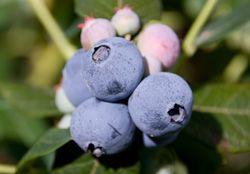
The season’s first Australian blueberries are on their way to export markets in Japan and the UK this week after heavy early rains pushed the season back four to five weeks.
Rain around Coffs Harbour in northern New South Wales, where the majority of the country’s blueberries are produced, was about 50 per cent higher than average in the first six months of the year.
“We normally start getting into good production in early August, but it’s just happening now,” Fruitnet heard from Peter McPherson, general manager of Berry Exchange, Australia’s biggest blueberry producer.
“Volumes have increased this year by 10-15 per cent, due to both new plantings coming into play and improved yields.”
Demand for Australian blueberries in Hong Kong and Singapore grew significantly last year and is expected to continue this year, said Mr McPherson, adding the UK market has stayed level.
“We start our programme with Marks & Spencer next week, and the first fruit for that has left already,” he said.
“We’re not overly positive about growing that market because of the price constraints – we’re a high-cost producer – but in the next six to eight weeks we expect to have a material share of that market with our superior proprietary varieties.”
The Japanese market has also stayed flat, although the domestic Australian market has been growing in leaps and bounds, with sales increasing around of 20 per cent in the last 12 months.
“It’s becoming a more mature market every year, but nowhere near it’s peak yet,” said Mr McPherson, adding Australian consumption volumes are now challenging those of Japan on the back of a strong promotional campaign.
Competition on export markets from Argentina is expected to be down this year because of the frost problems the country has suffered.
“The frost slowed them down, and put their season back 4-5 weeks. Argentina will be in markets mid-October. However, we do see a major clash coming in November when Chile comes on the market. We’ll see much greater volumes in November than we have in the past.”
Despite what Mr McPherson describes as the toughest 12 months he’s seen for global berry traders, Berry Exchange hit a performance record last year.
“We went against the rest of the world who seemed to struggle because of low prices throughout the year,” he told Fruitnet.
“There was a fair bit of bloodshed in the berry world. The challenge for us this year is to try to keep growing. The season hasn’t had a great start, so fingers crossed we can catch up.”



